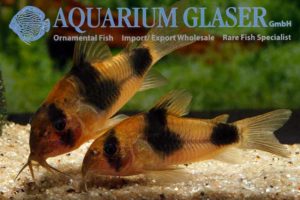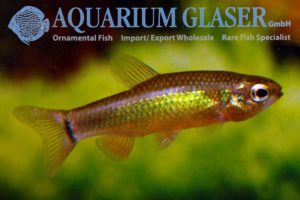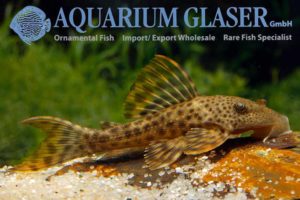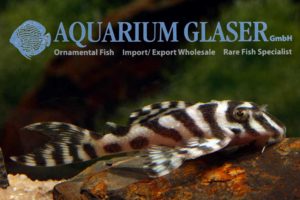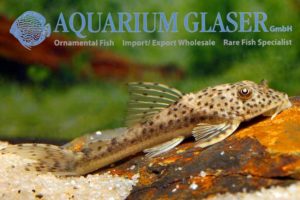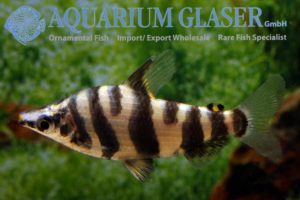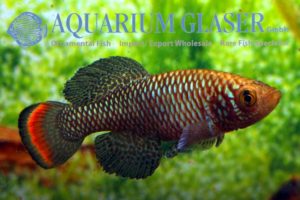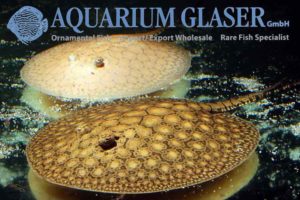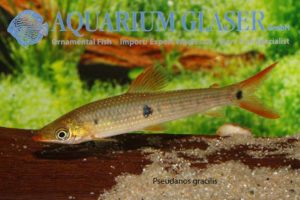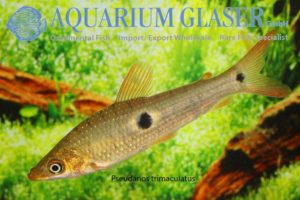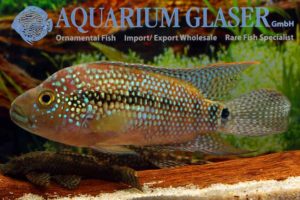This tetra originates from Brazil (Rio Sao Francisco and Itapicuru). It reaches a maximum length of about 7 cm. Currently we can offer German bred specimens of this attractive schooling fish. For our customers: the fish have code 268613 on our stocklist. Please note that we exclusively supply the wholesale trade. Text & photo: Frank […]
Fish Archive (3044)
-
-
Pseudomugil pellucidus
For the first time ever we can offer this rare blue eye. The completely peaceful fish – they attain a maximum length of about 4 cm – a very interesting due to the fact that the stripe in the anal fin differs individually from yellow to red. For our customers: the fish have code 446153 […]
-
Guppy Albino
One of our breeders has developed this unique and beautiful guppy sport from Magenta and Albino guppys. The fish are very healthy German bred ones! For our customers: the fish have code 419096 on our stocklist. Please note that we exclusively supply the wholesale trade. Available in very limited numbers only! Text & photos: Frank […]
-
Tetranematichthys wallacei
Currently three different species of the remarkable genus Tetranematichthys are distinguished by scientists. None of them is often imported, because their secretive way of life between dead driftwood makes catching them a pure matter of luck. So we are very glad to have managed the first imporation ever of the species Tetranematichthys wallacei from Venezuela. […]
-
Clibanarius africanus
The charming hermit crab Clibanarius africanus has become a very popular aquarium inhabitant. It is an euryhalin species, which means that it can survive in both pure fresh and pure marine water. However, it seems that it can live in pure freshwater only for a few months, so it is much better to keep it […]
-
Perisesarma huzardi
This crab is something like the big sister of the “classical” Red Mangrove Crab, Pseudosesarma moeschi. Regarding keeping that crab no major differences exist to that of the smaller relative with the exception that P. huzardi becomes as twice as large – about 8 cm carapax width. So the species needs bigger and more spacious […]
-
Cardisoma armatum
From the coasts of West and Central Africa originates Cardisoma armatum. The bright orange colored legs form a strong contrast to the blue body and let this crab become an attractive ornament. With a carapax diameter of approximately 10 cm it does not belong to the smallest crabs, therefore a spacy tank has to be […]
-
Biotoecus special
For the first time ever we can offer both species of Biotoecus that have been described scientifically so far at the same time! Both species are among the rarest fish in the trade and this is the reason why it is so remarkable to have both of them in stock. Moreover, we can offer for […]
-
Iguanodectes geisleri
The lizard tetras of the genus Iguanodectes are in general very rare aquarium fish. Currently 8 species are accepted. The very slender fish attain a maximum length of about 7 cm and are peaceful schooling fish. We could import the very pretty Iguanodectes geisleri from Venezuela. This blackwater fish is characterized by the three coloured […]
-
Corydoras aeneus “Puerto Maldonado”
We received this beautiful colour morph of the Bronze corydoras that exhibits a lot of orange colours from Peru. It belongs to the “Gold Shoulder” group, which is sometimes named Corydoras schultzei; however, this name is currently considered to be a synonym of C. aeneus. The fish is very rare and available in limited numbers […]
-
Carinotetraodon borneensis
This pufferfish lives exclusively in pure freshwater on Borneo and is only very rarely imported. The maximum length is about 6 cm (males) and 4 cm (females). In the wild this fish lives in soft and acidic water! For our customers: the animals have code 408102 on our stocklist. Please note that we exclusively supply […]
-
Crenicichla marmorata Lago Maracana
Lago Maracana is famous among aquarists for its beautiful discus. We now received for the first time ever two wonderful Crenicichla marmorata from that lake. The fish are currently 20-25 cm long. For our customers: the animals have code 671066 on our stocklist. Please note that we exclusively supply the wholesale trade. Text & photos: […]
-
Barbus partipentazona
Finally we received wild collected specimens of this pretty barb again. Maximum size, keeping etc. is exactly as in the well known tiger barb. Barbus partipentazona originates from the south of Thailand. For our customers: the fish have code 370603 on our stocklist. Please note that we exclusively supply the wholesale trade. Text & photos: […]
-
Tucanoichthys tucano
Finally we are able to offer this tiny, very nice and extremely rare dwarf tetra once more. For more information please see http://www.aquariumglaser.de/en/news/Tucanoichthys_tucano_en/. For our customers: the animals have code 298923 on our stocklist. Please note that we exclusively supply the wholesale trade. Text & photos: Frank Schäfer
-
Apistogramma paucisquamis and A. mendezi
Apistogramma mendezi Although Apistogramma mendezi can be imported only occasionally and is also rarely bred the beautiful species is known to develop a great number of local varieties. Additionally males of the very same local population show a high degree of polychromatism. The term polychromatism means that animals can show a differing individual colour pattern […]
-
Biotoecus dicentrarchus
Currently we can offer an absolute rarity from Venezuela: Biotoecus dicentrarchus. In this dwarf cichlid the male attains a maximum length of about 6 cm, the female of about 4-5 cm. The fish are sandbottom dwellers. For breeding the male builds a large sandhill where the pair is spawning. For our customers: the fish have […]
-
Hydrocynus goliath
Once more we received nice specimens of this gigantic predator from the Congo. For more information on the species, please see http://www.aquariumglaser.de/en/fish-archive/tetras-en/predatory-tetras-en/Hydrocynus_goliath_en/ For our customers: the animals have code 141403 on our stocklist. Please note that we exclusively supply the wholesale trade. Text & photos: Frank Schäfer
-
Hydrocynus goliath
The tigerfish of the genus Hydrocynus are the top predators among the freshwater fishes of Africa. H. goliath represents the largest species, maximum length reported so far is more than 130 cm and 50 kg weight. Our specimens currently are 10-12 cm long. Tigerfish are very popular among sport fishers, but aquarists specialized in predatory […]
-
Pterophyllum sp. Jatapu
Breathtaking, large, wild collected angelfish originating from the Rio Jatapu in Brazil arrived on wednesday. These animals have a very distinct black spot in the dorsal fin. We have never seen before such markings in angelfish. Possibly the angels represent a new, undescribed species. Even though the photo can – of course – not yet […]
-
Poecilocharax weitzmani
Of course this fish is known in the hobby for decades already, but isn´t it nevertheless a breathtaking beauty? The tiny animal is an ideal companion of the cardinal tetra, along with which it occurs in the natural habitat, too. For our customers: the animals have code 281002 on our stocklist. Please note that we […]
-
Bryconops cf. caudomaculatus
For the first time ever we could import this attractive tetra from Venezuela. Currently 12 species of Bryconops are described from Venezuela, but most of them are known from preserved specimens only. So our determination is only tentative. In any case the fish are very pretty; we suppose that they may reach a maximum length […]
-
Rasbora paucisqualis
It does not happen very often that we feel unable to determine an imported species at least roughly. But when a few weeks ago a shipment containing very small (about 1 cm) Rasboras from Thailand arrived we could name the fish only provisionally “Rasbora sp. Dwarf”. In the meantime the fish have grown happily and […]
-
Macrobrachium sp. Red Spot
We received from India (West Bengal) this attractive species of Macrobrachium, which we could not apply to any described species so far. For our customers: the animals have code 484733 on our stocklist. Please note that we exclusively supply the wholesale trade. Text & photos: Frank Schäfer
-
Apistogramma sp. Xingu (Vielfleck)
Apistogramma sp. Xingu is a Brazilian species of Apistogramma which is still undescribed scientifically. Like many Apistogramma species this fish has a number of varieties. We just received beautiful large bred specimens of the “Vielfleck”-variety (Vielfleck = many spots). For our customers: the fish have code 628744 on our stocklist. Please note that we exclusively […]
-
Acheilognathus tonkinensis
The bitterlings are a subfamiliy of the great and diverse carp family. So far only very few species have been introduced in the hobby, but there do exist about 70 species and subspecies which are classified in 4 genera. It is a sad thing that only so few aquarists are interested in bitterlings, for all […]
-
Acheilognathus tonkinensis
We received breathtaking, large Acheilognathus tonkinensis (Giant or Rainbow Bitterling). Fot more information, please click http://www.aquariumglaser.de/en/fish-archive/coldwater-fish/Acheilognathus_tonkinensis_en/For our customers: the animals have code 800154 on our stocklist. Please note that we exclusively supply the wholesale trade. Text & photo: Frank Schäfer
-
Baby reedfish arrived
Only once per year we obtain baby specimens of the reedfish. Now is the season for the charming animals. For our customers: the fish have code 128700 on our stocklist. Please note that we exclusively supply the wholesale trade. Text & photos: Frank Schäfer
-
Oryzias mekongensis
We received from Thailand one of the smallest species of ricefish. Oryzias mekongensis attains a maximum length of only 3 cm and is an ideal fish for so-called nano tanks. For our customers: the fish have code 339802 on our stocklist. Please note that we exclusively supply the wholesale trade. Text & photos: Frank Schäfer
-
Oryzias mekongensis
Code: 339802
-
Mogurnda adspersa
We obtained wonderful, 6-8 cm long German bred specimens of this Australian sleeper goby. For our customers: the animals have code 436353 on our stocklist. Please note that we exclusively supply the wholesale trade. Text & photos: Frank Schäfer
-
Hyphessobrycon cf. melanostichos
For the first time ever we can offer this attractive new tetra. Our specimens are German bred ones. Hyphessobrycon melanostichos has been described scientifically only in 2006. Until now the fish is known only from the upper reaches of the Rio Tapajos, namely a small river called Rio Doze de Outubro. If our fish are […]
-
Corydoras cf. kanei C142
C142 is a very beautiful, peaceful and comparatively small species of Corydoras: it becomes around 5 cm long. It is said that C142 originates from the Rio Tapajos. Corydoras kanei is quite similar to C142, but the latter is distinguished from the former by the bright golden spots on the neck and the operculum. Such […]
-
Thorichthys-Week at Aquarium Glaser
The genus Thorichthys originates from Central America. Formerly the fish were grouped in the catch-all genus Cichlasoma. The best known species is the fire mouth cichlid, Thorichthys meeki. All Thorichthys are very beautiful. Compared with other cichlids, Thorichthys are also quite peaceful. Currently we have a good number of species of Thorichthys in stock, which […]
-
Satanoperca rhynchitis
We received beautiful German bred specimens of this rare eartheater. Until the species has been described in 2012 under the name of Satanoperca rhynchitis it was known in the hobby as Satanoperca sp. “Red Lips”. The fish develop the pretty red lips only when adult, so we add a picture of an adult specimen to […]
-
Panque suttoni
The Blue-eyed Panaque was in the 1980ies one of the most common loricariids in the trade. By the way: the correct scientific name is Panaque suttonorum. For unknown reasons the fish is hardly available nowadays. There are, however, a lot of rumours. Some say that an ecological catastrophe appeared, others tell that a madman has […]
-
Crenicichla sp. Fire Spot Venezuela (= sp. Inirida III)
Two days ago we were able to import a single specimen of pike cichlid , which we have never seen before. The animal for sure belongs to the rambling relationship of Crenicichla saxatilis; however, no scientific description on a species exist that has red instead of black markings on the body. Our specimen – most […]
-
Polypterus ansorgii xxl
We obtained impressive, 50-60 cm long specimens of this rarest of all species of Polypterus. The fish originate from Guinea. For our customers: the animals have code 162409 on our stocklist. Please note that we exclusively supply the wholesale trade. Text & photo: Frank Schäfer
-
Crenuchus cf spilurus Venezuela
Along with the new, red species of Crenuchus that lacks the tail spot (see http://www.aquariumglaser.de/en/fish-archive/tetras-en/south-america-en/A_new_species_of_Crenuchus__en/) we received splendid, large Crenuchus cf. spilurus from Venezuela. Some specimens also have a reddish basic coloration, others are yellowish. Only the males develope the gorgeous sailfins. For our customers: the animals have code 250225 on our stocklist. Please note […]
-
Barilius bakeri
We could import this breathtaking beautiful barb from the South of India (Kerala). The species is an ideal ornamental fish for larger show aquaria. It attains a length of 12-15 cm. One should keep Barilius bakeri always in schools (from 5 specimens upwards), otherwise they are often very quarrelsome. For our customers: the fish have […]
-
Apistogramma velifera
This pretty dwarf cichlid was known in the hobby under the names of Apistogramma sp. “Segelflossen” (=sailfin), A. sp. “Puerto Ayacucho” and A. sp. “Vierstreifen” (= four stripes) until it became described scientifically. The species has never been imported on a regular basis and currently no importations appear at all. So we are quite happy […]
-
Peckoltia sp. Alto Nhamunda
For the first time ever we could import this attractive dwarf suckermouth catfish. The maximum length observed was about 14 cm. The males – they can be easily recognized by the long “whiskers” – have a very obvious different colour compared with the females. For our customers: the animals have code 277334 on our stocklist. […]
-
Trochilocharax ornatus
Once more we were able to import the charming, only 2 – 2.5 cm long crystal rainbow tetra from Peru. For more information on the fish, please click http://www.aquariumglaser.de/en/news/The_crystal_rainbow_tetra_has_been_described_Trochilocharax_ornatus_en/ For our customers: the fish have code 258333 on our stocklist.Please note that we exclusively supply the wholesale trade.
-
Danio dangila
We received once more very pretty Danio dangila from India. This species is the type species of the genus Danio. D. dangila attains a maximum length of about 12 cm. Each individual has a bit different pattern. The coloration reminds one in Damascus steel. For our customers: the fish have code 413403 on our stocklist. […]
-
A new species of Crenuchus!
We were able to import this obviously undescribed species of Crenuchus from Venezuela. This beautiful, reddish tetra is distinguished from the only described species of the genus (Crenuchus spilurus) by the deeper body, the orange-red fins, the only hardly visible caudal spot and the fact that the anal fin in males of the new Crenuchus […]
-
Barbus fasciolatus
Only very few species of barbs from Africa became established as ornamental fish, although a great number of small species occurs there. Only one single species is bred on a regular basis and can be found in the trade quite often: Barbus fasciolatus, the African banded barb. This fish is a real beauty! A well […]
-
Betta mahachaiensis and Betta siamorientalis
These beautiful species of wild Betta have been described scientifically recently. We have both species in stock. Our tentative designations for the fish were Betta sp. Mahachai for B. mahachaiensis and Betta cf. imbellis Black Vietnam for Betta siamorientalis so far. Both species are very nice, comparably peaceful fighting fishes. Keeping and breeding is similar […]
-
Leporinus sp. aff. tigrinus
This beautiful striped Leporinus originates from the Ventuari river in Venezuela. It represents possibly a still undescribed species of Leporinus; Leporinus with a similar coloration are known so far only from the Rio Tapajos and Rio Xingu in Brazil; these “haresnouts” (this is what the name Leporinus means translated) have been described in 1929 under […]
-
Betta ferox
We received a very small number of fully grown specimens of that very rare species of Betta as German bred ones. The mouthbrooding species is known so far only from a very small area in Thailand (Bori Pat). Here the fish inhabit brooks with soft and slightly acidic water. The water temperature there is around […]
-
Hemichromis cerasogaster
This small species of cichlid attains a maximum length of about 10 cm. It belongs to the so-called red cichlids, but has a lilac basic body coloration. The species lives exclusively in the Lac Mai Ndombe in the D. R. Congo. There are usually no commercial importations of this species from that lake and so […]
-
Parosphromenus cf. filamentosus Ampah
This pretty new species of licorice gourami originates from Borneo (southeast Kalimantan). Here it can be found between Ampah and Muarateweh. The species is very close to P. filamentosus and becomes around 3 cm long. Like all licorice gouramis the species prefers small, single species tanks, soft and acidic water and fine live food. Females […]
-
Danio kyathit and Danio quagga
We received fantastic wild collected fish of both species of Danio from Burma. They are close relatives of the well known zebra fish (Danio rerio), reach a comparable size and can be kept and bred in the very same way. Danio quagga has been thought to be a mere variety of D. kyathit for a […]
-
Chela cachius
This pretty flying barb is imported only very occasionally. It originates from the north of India. The species attains a length of about 5 cm and is a peaceful schooling fish that uses to swim in the upper layers of the water column. The coloration of Chela cachius is very interesting. If there is a […]
-
Diskus wild Heckel Blue Uatuma
We obtained very nice Discus Heckel in different sizes from the Uatuma river. The patterns of the individual fish vary a lot, but all of them have a lot of blue color in the horizontal stripes of the body. Even some blue headed fish are among these discus. All pictures are taken from fish that […]
-
Acestridium dichromum arrived!
We received once more the very rare dwarf suckermouth catfish Acestridium dichromum from Venezuela. The species attains a length of 5-6 cm only. The species could be called “chameleon dwarf sucker cat”, for it becomes bright green when sitting on plant leaves, but changes colour to brown within a few days when only roots and […]
-
Scalare Super Red Devil
We currently received this unique selected sport of the angel in sizes md – xlg. The colours are breathtaking! Available in limited numbers only. For our customers: the fish have code 697574 on our stocklist. Please note that we exclusively supply the wholesale trade. Text & photo: Frank Schäfer
-
Steatocranus casuarius WILD
We currently have very nice wild collected humphead cichlids in stock. This classical aquarium fish can attain a maximum length of 11 cm in males. For our customers: the fish have code 575003 on our stocklist. Please note that we exclusively supply the wholesale trade. Text & photo: Frank Schäfer
-
Steatocranus sp. Dwarf
For the first time ever we can offer this type of humphead cichlid. The scientifically still undescribed species represents the smallest member of the genus Steatocranus. Males can attain a maximum length of about 8 cm, females stay smaller. The fish originate from the Congo, but our fish are German bred ones. For our customers: […]
-
Micropoecilia parae Red Tiger
Once more we obtained a number of this beautiful livebearer, M. parae. Micropoecilia parae represents a wild form of livebearing fish, not a bred sport. The fish are not close relatives of the guppys and cannot be crossbred with them. The females of M. parae can be recognized by the shoulder spot. For our customers: […]
-
Nannacara sp. Sourourou
The funny name of the species, which has not been researched by scientists so far, derives from the collecting site, the Crique Sourourou in French Guyana. This Crique flows near the coast and is a tributary to the rivers Sinnamary and Kourou. It has been collected in 2002 by Wolfgang Staeck, who brought it to […]
-
Microctenopoma ansorgii
We received very nice and stable wild collected red dwarf bushfish from the congo. The species belongs to the bubble-nest builders and becomes about 6-8 cm long. Currently the fish are 3-4 cm long. For our customers: the animals have code 115501 on our stocklist. Please note that we exclusively supply the wholesale trade. Text […]
-
Microctenopoma ansorgii
Microctenopoma (Ctenopoma) ansorgii belongs reliably to the most beautiful bushfishes. The African bushfishes are the counterpart to the numerous labyrinth fish genera spread in Asia. Like their asiatic cousins they are bubble nest builders and the male will adopt the brood care. Their appetite is big and wild caughts need for acclimatizing strong living food. […]
-
Cherax sp. Papua
This Cherax represents in all probability a still undescribed species. We received a small number of the attractive animal from Papua New Guinea. The crayfish are very pretty due to the rusty red spots on the back. The animal can be kept along with fish, but feeds often on plants. For our customers: the crayfish […]
-
Crenicichla lugubris Jutai
Jutai is a municipality in western Brazil, named after the Rio Jutai, which is an affluent to the Amazon river. From this region originates the impressive, beautiful Crenicichla lugubris, which we could import in very small numbers. The females can be recognized by the broad white seam in the dorsal fin. Currently our specimens are […]
-
Discus wild Royal Green Tefé
This wonderful coloured green discus from Tefé is available in very limited numbers only! For our customers: the animals have code 737005 on our stocklist. Please note that we exclusively supply the wholesale trade. Text & photos: Frank Schäfer
-
Discus Gold Xingu
We were able to obtain for the first time some brown discus from the Rio Xingu. The animals are very stout and healthy. Dominant individuals become yellow-golden all over the body. For our customers: the fish have code 732605 on our stocklist. Please note that we exclusively supply the wholesale trade. Text & photos: Frank […]
-
Pterophyllum scalare Santa Isabel
We received wonderful wild collected angelfish from the municipality of the city Santa Isabel at the Rio Negro. Like many other fishes from that area – mainly discus and Apistogramma – the angels show a high degree of red coloration on the body. The reason for that phenomenon is unknown to us. The water in […]
-
Xiphophorus kallmani
The Catemaco Swordtail is a splendid, large species of swordtail. Females can reach a length up to 12 cm! The wonderful metallic golden shine is species-specific and led to the alternative popular name “Brass Swordtail” in the hobby, long before the species has been described scientifically. For our customers: the fish have code 420162 on […]
-
Rasbora patrickyapi
For the first time ever we can offer this beautiful species of blackwater Rasbora. The fish attains a maximum length of about 5 cm. In its natural habitat the species is restricted to peat swamps in the central parts of Kalimantan (the Indonesian part of Borneo). Here the pH is very low. Nevertheless the species […]
-
Hoplias cf. teres
For the first time ever we were able to import this trahira from Venezuela. We received only very few specimens. The new species differsfrom all Hoplias imported so far by the brillant coloured eye. However, we are not able to confirm the scientific name of H. teres, a species described by Valenciennes in 1847 from […]
-
Guppy Blue Jeans
This is the latest sport of guppy, bred in South East Asia. Like the trousers, after which this guppy is named, it is an everlasting beautiful, powerful, dainty, and very robust fish. For our customers: the fish have code 418333 on our stocklist. Please note that we exclusively supply the wholesale trade. Text & photo: […]
-
Acnodon normani
We are able to import this rare and comparably small (up to 13.5 cm standard length without caudal fin), pretty pacu only very occasionally. This is due to the fact that Acnodon represents a type of fish that lives in open waters. This is also obvious from its typical pattern, consisting of thin vertical stripes […]
-
Barbus rhomboocellatus
We received wonderful wild collected specimens from Borneo. The males have a lot of red in their basic coloration. Keeping and breeding are comparable to the better known close relative, Barbus pentazona. For our customers: the animals have code 370923 on our stocklist. Please note that we exclusively supply the wholesale trade. Text & photos: […]
-
Crenicichla sp. Bela Union Uruguay
Code number: 673011 Photos: Thomas Weidner
-
Crenicichla sp. Bela Union Uruguay
We received very nice German bred specimens (current size: 5-7 cm) of this pretty pike cichlid. The bright red eyes make it peculiarly attractive. For additional pictures of adult specimens please see http://www.aquariumglaser.de/en/crenicichla-sp-bela-union-uruguay_de_1253.html For our customers: the fish have code 673012 on our stocklist. Please note that we exclusively supply the wholesale trade. Text & […]
-
Steatocranus sp. Ultra Slender
For the first time we can offer this scientifically still undescribed species that originates from the Congo. It represents the smallest and most slender species of humphead cichlid known so far. Males are sexually ripe at a length of about 6 cm, females at about 5 cm. Our fish are German bred ones. Fort our […]
-
Caridina sp. Mosura Shrimp
We received a shipment of this extremely charming sport of the Crystal Red or Red Bee Shrimp from Indonesia. For our customers: the animals have code 485358 on our stocklist. Please note that we exclusively supply the wholesale trade. Text & photos: Frank Schäfer
-
Adontosternarchus clarkae
Marbled Dwarf Ghosts. The most important species New World Knifefishes or Ghosts in the ornamental fish trade are without any doubt the Black Ghost (Apteronotus albifrons) and the Brown Ghost (A. leptorhynchus). We have both species in stock on a regular basis, the Black Ghost both as wild collected from Colombia/Venezuela and bred ones, the […]
-
Metynnis cf. lippincottianus
We received very pretty spotted silverdollars from Brazil. The particular variety is sexually differentiated at a very early stage. In our specimens, which are about 6 cm long, the sexes are already distinguished. The males have an orange spot on the shoulder, shining scales on the back and the outer border border of the anal […]
-
Trachydoras paraguayensis
We have received one more charming species of thorny catfish from Paraguay. T. paraguayensis becomes around 10 cm long and can be kept in the same way as a larger species of Corydoras. This means: a peaceful fish, undemanding regarding food and likes to swim in company of its own kind. For our customers: the […]
-
Ossancora punctata
Despite the facts that this pretty thorny catfish, which we were able to import once more from Paraguay, is known to science since 1855 and has an enormous wide distribution in South America – it is reported from Argentina, Brazil, Bolivia, Colombia, and Peru, where it is found both in white and black water – […]
-
Nothobranchius guentheri
Just in: wonderful German bred Nothobranchius guentheri. This Nothobranch reaches an age of about two years under aquarium conditions. For our customers: the fish have code 332502 on our stocklist. Please note that we exclusively supply the wholesale trade. Text & photos: Frank Schäfer
-
Lasiancistrus heteracanthus
We were able to import the rare Red-eyed Deltatail-suckercat, Lasiancistrus heteracanthus, in small numbers from Peru. The species attains a total length of 15-18 cm. Besides the bright red eye the most striking feature of the species is the pretty brown-red lower lappet of the caudal fin. Lasiancistrus, in general, are good algae-eaters and fit […]
-
Crenicichla compressiceps
The season for this wonderful dwarf cichlid has started. Males attain a maximum length of about 8 cm, females stay smaller and become only 6-7 cm long. Both sexes of the variety we currently have in stock has black bands in the vertical fins. Males can be recognized best by the overall shape (larger and […]
-
Geophagus sp. Rio Caete
Once more we were able to import this beautiful eartheater from the Rio Caete in the northeastern part of Brazil. The species is not described scientifically yet, but belongs without any doubt in the close relationship of the species Geophagus parnaibae and G. sp. “Pindare”. In all probability G. sp. Rio Caete attains a similar […]
-
Corydoras sp. aff. elegans C 126
This is a further new species of Corydoras from the Madre de Dios region. The species attains a maximum length of about 4-5 cm. Males and females look very different. Whereas the males have a coloration similar to that of C. elegans, the females imitate the C. aeneus “Madre de Dios”. In contrast to many […]
-
Melanotaenia rubrostriata
We obtained very nice German bred specimens of this colorful rainbowfish, which is found in the trade only very occasionally. Our specimens are currently 5-7 cm long. The species attains a maximum length of about 14 cm and each centimeter the fish grows it becomes even more colorful! For our customers: the fish have code […]
-
Cyphotilapia frontosa “Black Widow”
We received very nice specimens of this rare mutant of the Lake Tanganjika Humphead, which occured around the year 2004 for the first time. Our fish have a size of 7-8 cm. For our customers: the animals have code 517243 on our stocklist. Please note that we esclusively supply the wholesale trade. Text & photo: […]
-
Rivulus rubrolineatus
This beautiful killifish originates from Peru. Currently we can offer this rare fish as wild collected ones. Rivulus are dwelling always near the water surface and especially R. rubrolineatus is a perfect aquarium fish for the upper region of a tank. However, one must cover the tank perfectly, for Rivulus use to change their habitat […]
-
Apistogramma sp. BOLIVIA GOLD
The shipment from the Madre de Dios region in Bolivia also contained a pretty new species of Apistogramma. The fish is without any doubt a close relative of A. luelingi. Due to its bright yellow coloration we provisionally named it “Bolivia Gold”. Our largest males have a length of about 4 cm, the females are […]
-
Corydoras weitzmani WILD
We received a shipment of beautiful, fully grown wild collected Corydoras weitzmani from Peru. The species is extremely rare in the trade. Our fish have a perfect condition! There were strong doubts not long ago that the species might not exist at all or that it has been extinct. This was due to the fact […]
-
Neolebias ansorgii
This dainty little characin was a fairly popular aquarium fish in the 1950s and 1960s – according to the literature, at least. Nowadays it is only very rarely seen in the trade. The species is comparatively widespread in Central Africa. It has been reported from Angola, Benin, Nigeria, Cameroon, Gabon, and the D. R. Congo […]
-
Hypostomus sp. Bolivia Redfin
In the Mergus Welsatlas, Vol.2, page 1110 the authors H.-G. Evers and I. Seidel illustrate a pretty Hypostomus originating from Bolivia. The determination of the species was not possible yet. The species reminds one strongly of L231 from Peru, but the new pleco from Bolivia has nice orange-reddish seams in the fins. We currently received […]
-
Hypancistrus sp. L236 bred
Zebra plecos from the Rio Xingu and its affluents are banned for exportation for years already. Even at the times when a legal exportation was possible, L236 from the Rio Iriri (an affluent of the Xingu) was extremely rare and only few specimens were caught per year. The specimens we currently have in stock are […]
-
Aphanotorulus frankei Bolivia
The genus Aphanotorulus contains only two species, following some scientists: A. ammophilus from the Orinoco basin and A. unicolor from the complete upper Amazon basin. However, aquarists are by far more splitting in this respect and distinguish at least four different species, among them A. frankei from Peru. We now received a shipment Aphanotorulus from […]
-
Abramites hypselonotus
We received very nice Marbled Headstanders in perfect aquarium size (4-6 cm) from Venezuela. The shipment contains a lot of specimens with a very contrasting pattern. For our customers: the fish have code 200502 on our stocklist. Please note that we exclusively supply the wholesale trade. Available in limited numbers only. Text & photo: Frank […]
-
Nothobranchius pienaari
Rachow´s Nothobranch (Nothobranchius rachovii) belongs to the most popular species of this genus. The fish is extremely colourful and exhibits a gorgeous behaviour while displaying and mating. Most aquarium strains of N. rachovii are descendants of specimens that have been collected in 1958 by E. Roloff near Beira in Mozambique. However, now and then also […]
-
Potamotrygon scobina
We received German bred specimens of this comparatively small (about 35 cm disc width) freshwater stingray. The species is restricted – as far as known – to the Rio Tocantins in Brazil. For our customers: the animals have code 282012 on our stocklist. Please note that we exclusively supply the wholesale trade. Available in very […]
-
Pseudanos gracilis
On tuesday 28.8.2012 we informed you in our Extra-Newsletter that the rare headstander Pseudanos trimaculatus from Peru had arrived. One of our readers – a specialist in headstanders – informed us kindly that the import contains two species, the rare P. trimaculatus and the even rarer Pseudanos gracilis. Hearty thanks for the hint! We have […]
-
Pseudanos trimaculatus
We received the very rare Threespotted headstander from Peru. The size of the fish is 5-7 cm. For our customers: the fish have code 206103 on our stocklist. Please note that we exclusively supply the wholesale trade. Text & photo: Frank Schäfer
-
Rocio octofasciata CHIAPAS
We received German bred F1-generation specimens of wild collected Jack Dempsey cichlids with collecting data. The fish is also known in elder literature under the names of Cichlasoma octofasciatum or C. biocellatum. Available for the first time ever, usually only old aquarium strains with unknown origin are traded. For our customers: the fish have code […]
- « Previous Page
- 1
- …
- 20
- 21
- 22
- 23
- 24
- …
- 31
- Next Page »





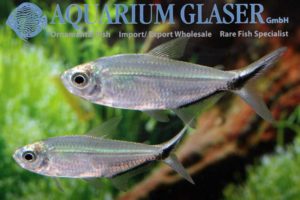
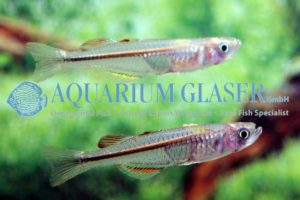
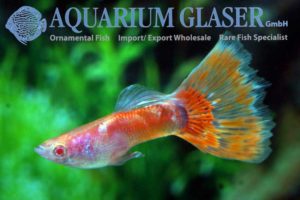
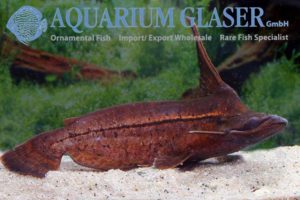
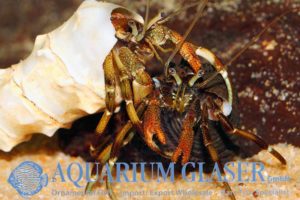
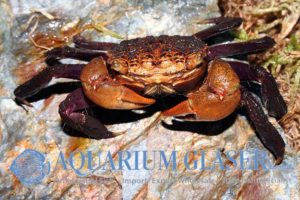
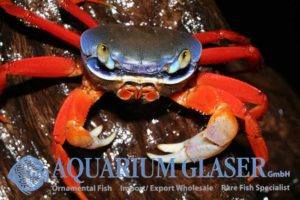
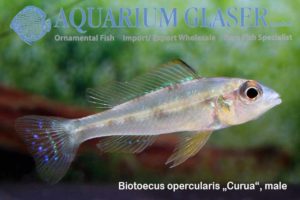
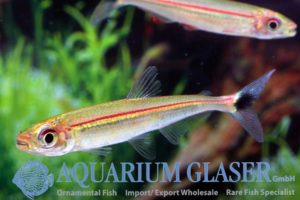
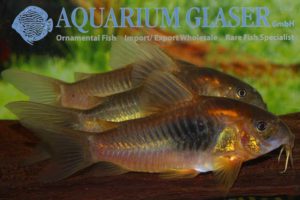
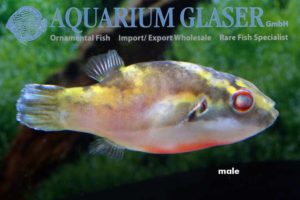
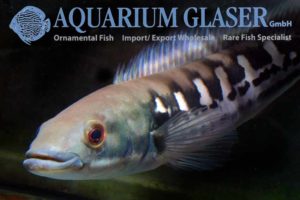
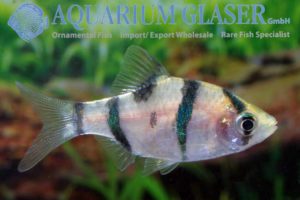
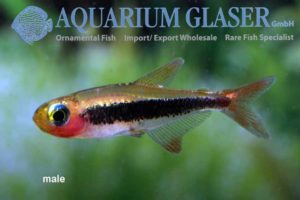
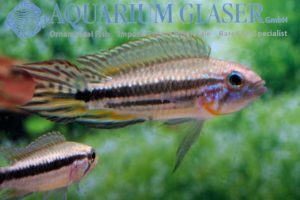
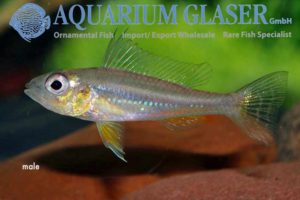
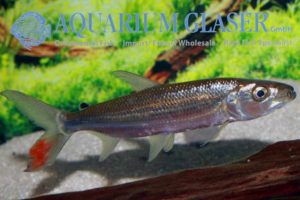
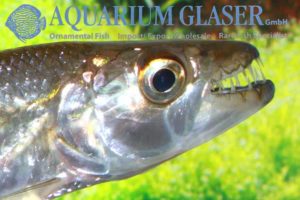
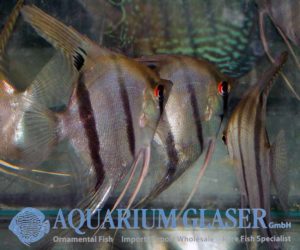
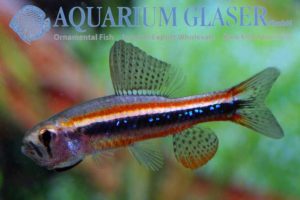
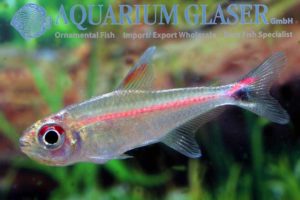
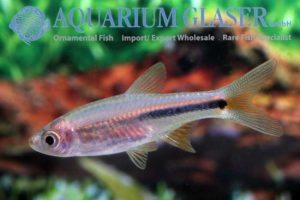
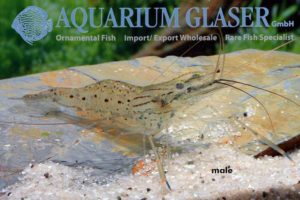
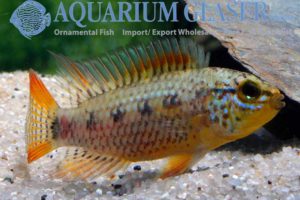
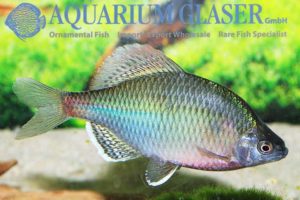
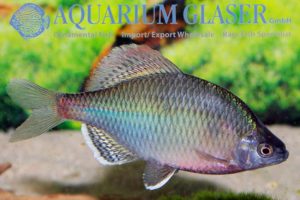
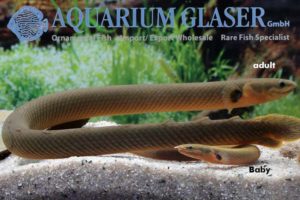
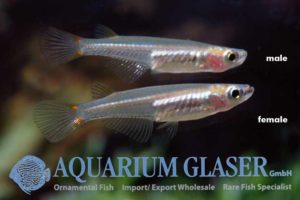
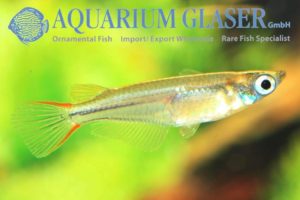
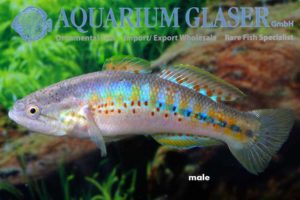
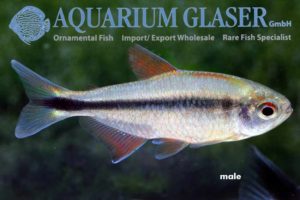
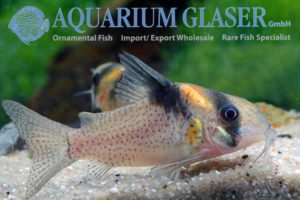
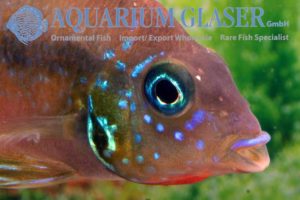
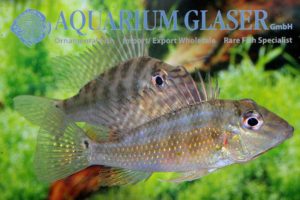
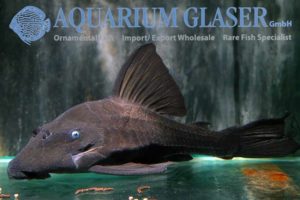
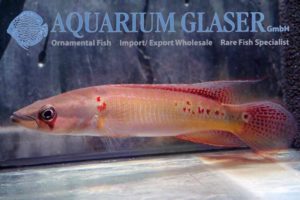
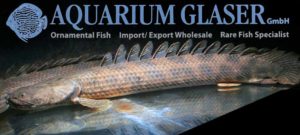
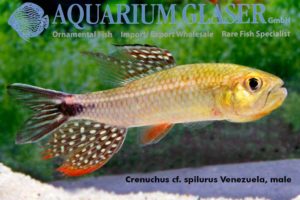
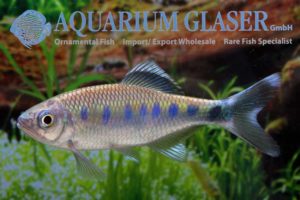
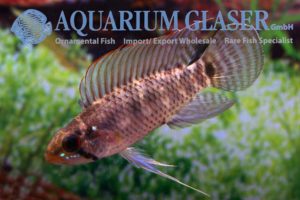
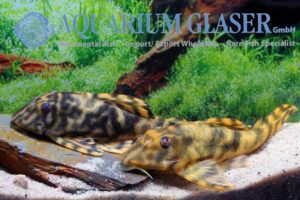
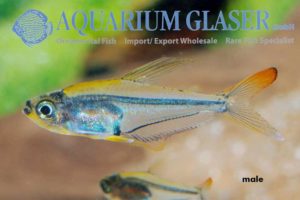
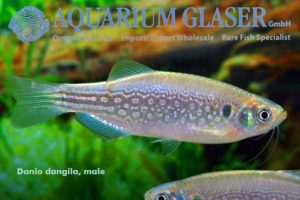
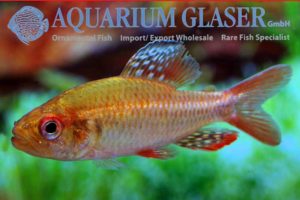
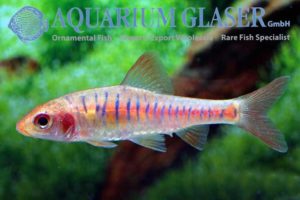
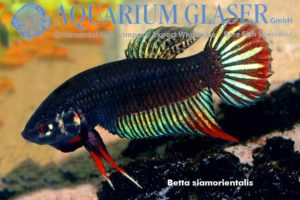
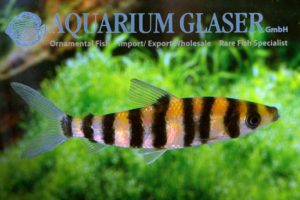
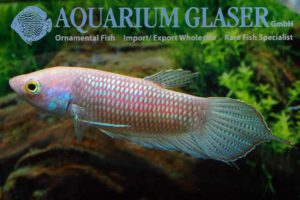
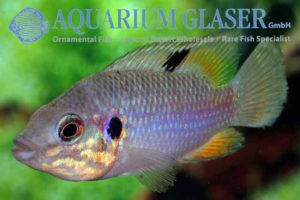
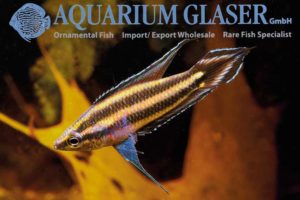
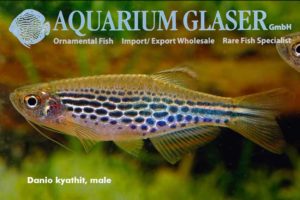

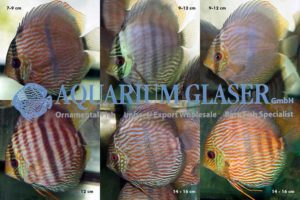
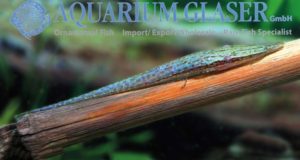
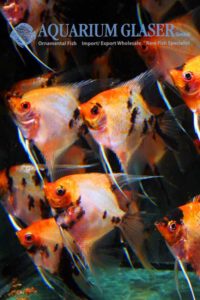
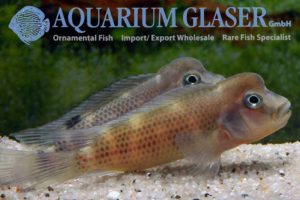
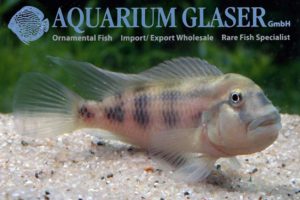
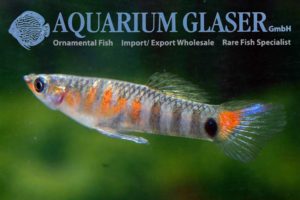
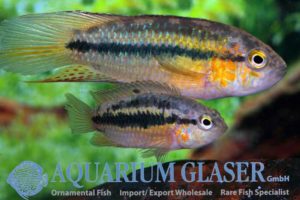
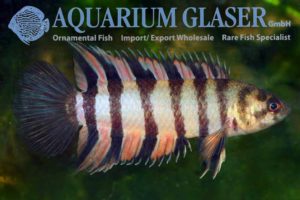
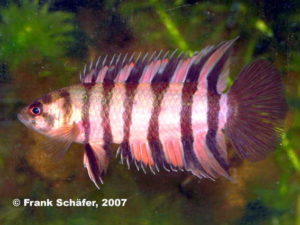
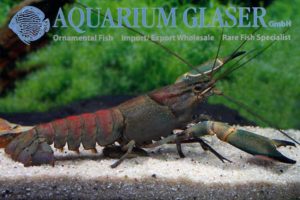
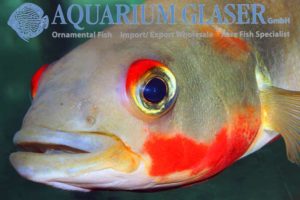
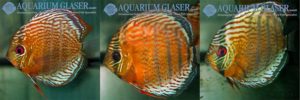
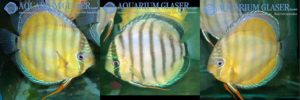
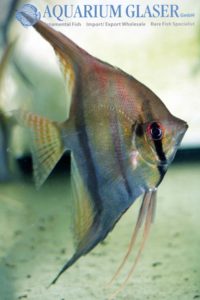
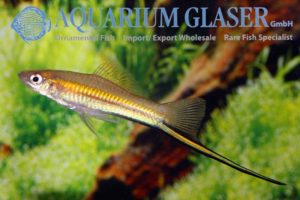
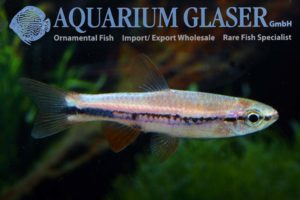
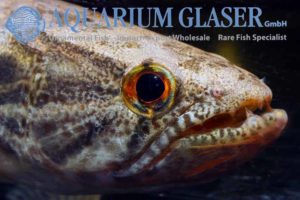
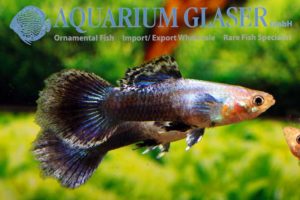
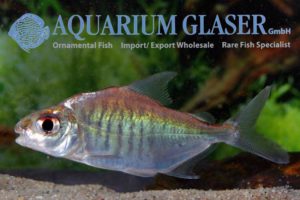
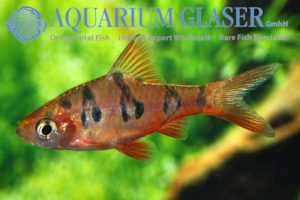
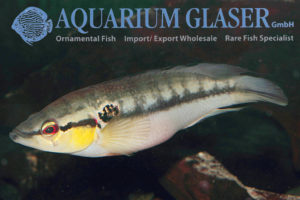
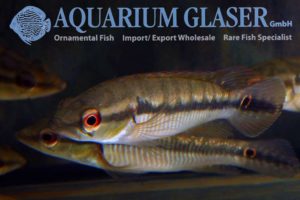
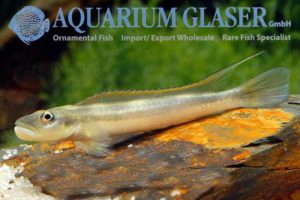
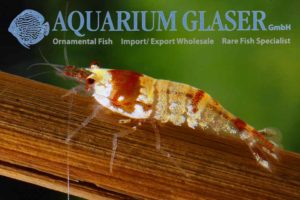
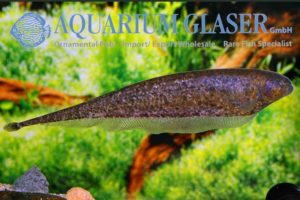
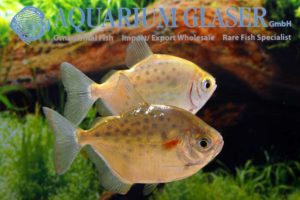
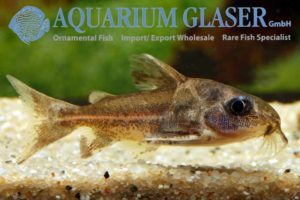
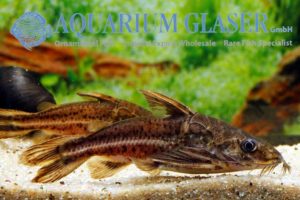
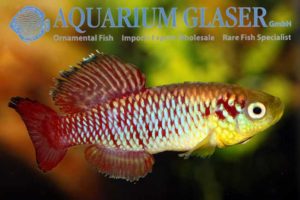
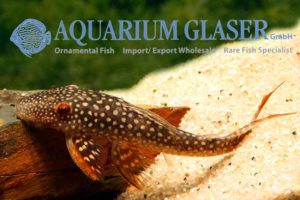
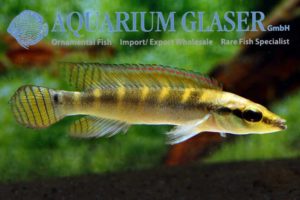
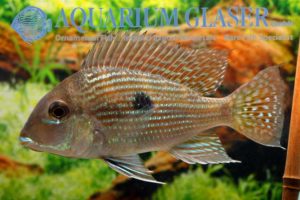
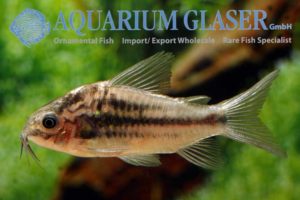
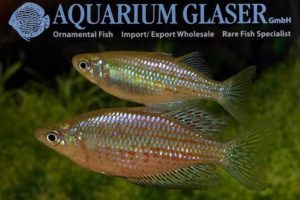
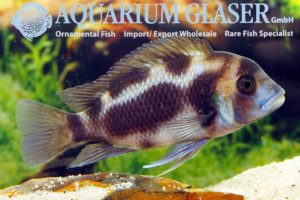
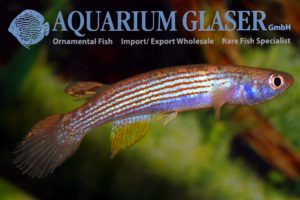
-mann-300x200.jpg)
